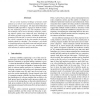1021 search results - page 91 / 205 » Model selection in genetic programming |
123
Voted
APAQS
2000
IEEE
15 years 7 months ago
2000
IEEE
The use of the statistical technique of mixture model analysis as a tool for early prediction of fault-prone program modules is investigated. The Expectation-Maximum likelihood (E...
119
Voted
ATAL
2010
Springer
15 years 3 months ago
2010
Springer
An important drawback to the popular Belief, Desire, and Intentions (BDI) paradigm is that such systems include no element of learning from experience. In particular, the so-calle...
103
Voted
CEC
2005
IEEE
15 years 8 months ago
2005
IEEE
We solve the Flexible Job-Shop Problem (FJSP) by using dispatching rules discovered through Genetic Programming (GP). While Simple Priority Rules (SPR) have been widely applied in ...
157
Voted
CEC
2007
IEEE
15 years 6 months ago
2007
IEEE
This article, which lies within the data mining framework, proposes a method to build classifiers based on the evolution of rules. The method, named REC (Rule Evolution for Classif...
141
Voted
COR
2004
15 years 2 months ago
2004
Fair bandwidth allocation is an important issue in the multicast network to serve each multicast traffic at a fair rate commensurate with the receiver's capabilities and the ...

